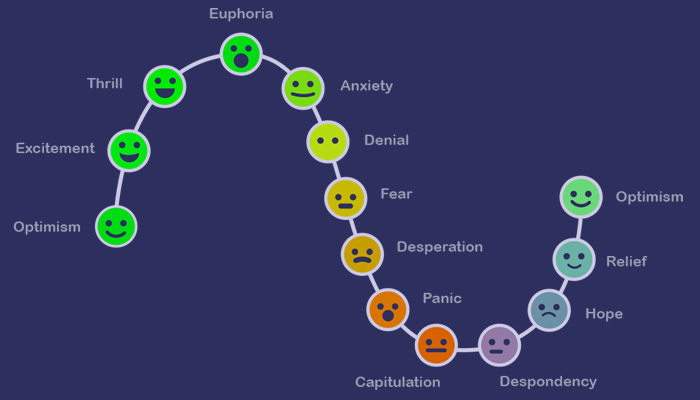Successful trading in financial markets isn’t just about analyzing numbers and charts; it’s also about understanding the psychology behind it. Emotions play a significant role in trading, and learning to manage and overcome these emotions is crucial for achieving success in the trading world. In this article, we will explore the psychology of successful traders and how they overcome their emotions.
- Emotion in Trading
Emotions such as fear, greed, and anxiety can lead to impulsive decision-making and poor trading outcomes. Traders often experience a rollercoaster of emotions as they navigate the ups and downs of the market. Understanding these emotions is the first step in overcoming them.
- Discipline and Self-Control
One of the most critical traits of a successful trader is discipline. Successful traders follow a well-thought-out trading plan and stick to it regardless of market fluctuations. They exercise self-control and avoid making impulsive decisions driven by fear or greed.
- Risk Management
Emotion-driven trading often leads to taking excessive risks. Successful traders are aware of this tendency and use risk management strategies to protect their capital. They set stop-loss orders and never risk more than they can afford to lose.
- Continuous Learning
Successful traders view trading as an ongoing learning process. They are not discouraged by losses but see them as opportunities to learn and improve. They regularly analyze their trades and adapt their strategies as needed.
- Patience and Resilience
The market is known for its unpredictability. Successful traders understand that there will be winning streaks and losing streaks. They remain patient during tough times and stay resilient. They don’t let a single bad trade affect their overall strategy.
- Objective Analysis
Successful traders rely on objective analysis rather than subjective emotions. They base their decisions on technical and fundamental analysis, not on gut feelings. They have a clear understanding of their entry and exit points and adhere to them.
- Mental Well-Being
Emotional well-being plays a vital role in trading success. Stress and anxiety can cloud judgment and lead to costly mistakes. Successful traders prioritize mental health by managing stress through activities like meditation, exercise, and maintaining a healthy work-life balance.
- Community and Support
Trading can be a solitary endeavor, but many successful traders seek the support of trading communities or mentors. Sharing experiences and strategies with like-minded individuals can provide valuable insights and emotional support.
- Accepting Losses
Losses are an inherent part of trading. Successful traders accept this reality and view losses as part of the cost of doing business. They don’t dwell on past mistakes but focus on making informed decisions moving forward.
- Adaptability
Markets change, and so do successful traders. They adapt to new market conditions and evolving strategies. They are not rigid in their approach and are willing to explore new opportunities.
Conclusion
The psychology of successful traders is a complex interplay of discipline, emotional control, and adaptability. These traders understand that emotions are part of the trading experience but do not let them dictate their decisions. Instead, they use their emotional intelligence to make informed, objective choices.
Successful trading is not solely about making profits; it’s about building a sustainable and rewarding career. By managing emotions and developing a strong trading psychology, traders can increase their chances of success in the challenging world of financial markets. Remember that successful trading is a journey, and every trader, no matter how experienced, continues to refine their emotional discipline and trading skills.
